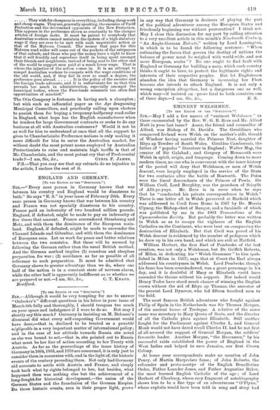[To THE EDITOR OF THE " SPECT•TOR."1 SIR, — Although it would
be very tempting for me to answer " Onlooker's " different questions in his letter in your issue of March 6th fully and thoroughly, I should trespass too much on your space and indulgence if I were to do so. But may I shortly say this much ? Germany in insisting on M. Delcasse's dismissal did what every sell-respecting Government would have done,—that is, declined to be treated as a guantite negligeable in a very important matter of international policy; and in the case of her attitude towards Russia she acted as she was bound to act,—that is, she pointed out to Russia what must be her line of action according to her Treaty with Austria. As far as the proceedings of the inner history of Germany in 1864,1866, and 1870 are concerned, it is only just to consider them in connexion with, and in the light of, the historic events of the century preceding them. Not only had Germany old accounts to settle with Austria and France, and simply took back what by rights belonged to her, but besides, what happened then was nothing else but the achievement of a long-fought-for historical development,—the union of the German States and the foundation of the German Empire. Do these historic events, seen in their proper light, prove in any way that Germany is desirous of playing the part of the political adventurer among the European States and frivolously beginning war without provocation ? I think not. May I close this discussion for my part by calling attention to a very excellent article in this month's Nineteenth Century, " An Anglo-German Entente," written by Lord Lamington, in which is to be found the following sentence: "When estimating the forces that govern the destiny of nations the balance of power must be weighed with world-wide, and not mere European, scales " ? No one ought to find fault with England or Germany for building a navy, which each country thinks it ought to have, to protect the legitimate rights and interests of their respective peoples. But let Englishmen abandon the idea that Germany is increasing her Fleet because she intends to attack England. It is not only a wrong conception altogether, but a dangerous one as well, which may—if insisted on—prove fatal to both countries one
of these days.—I am, Sir, &c., E. S.














































 Previous page
Previous page